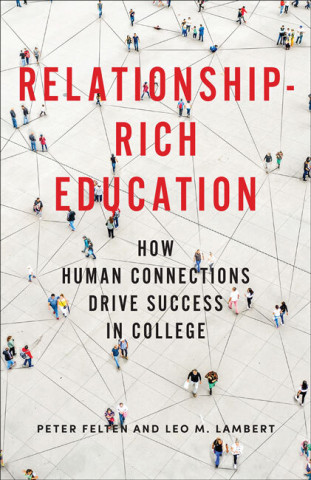
Relationship-Rich Education
What single factor makes for an excellent college education? As it turns out, it’s pretty simple: human relationships. Decades of research demonstrate the transformative potential and the lasting legacies of a relationship-rich college experience. Critics suggest that to build connections with peers, faculty, staff, and other mentors is expensive and only an option at elite institutions where instructors have the luxury of time with students. But in this revelatory book brimming with the voices of students, faculty, and staff from across the country, Peter Felten and Leo M. Lambert argue that relationship-rich environments can and should exist for all students at all types of institutions.
In Relationship-Rich Education, Felten and Lambert demonstrate that for relationships to be central in undergraduate education, colleges and universities do not require immense resources, privileged students, or specially qualified faculty and staff. All students learn best in an environment characterized by high expectation and high support, and all faculty and staff can learn to teach and work in ways that enable relationship-based education. Emphasizing the centrality of the classroom experience to fostering quality relationships, Felten and Lambert focus on students’ influence in shaping the learning environment for their peers, as well as the key difference a single, well-timed conversation can make in a student’s life. They also stress that relationship-rich education is particularly important for first-generation college students, who bring significant capacities to college but often face long-standing inequities and barriers to attaining their educational aspirations.
Drawing on nearly 400 interviews with students, faculty, and staff at 29 higher education institutions across the country, Relationship-Rich Education provides readers with practical advice on how they can develop and sustain powerful relationship-based learning in their own contexts. Ultimately, the book is an invitation—and a challenge—for faculty, administrators, and student life staff to move relationships from the periphery to the center of undergraduate education.
Book Club Group Options-
Please review the following book club group options, then fill in the form below. Each University will be limited to 10 participants. Groups will be filled in order that sign-ups are received. Please pick your first, second, and third preferences.
Once we have received everyone’s preferences, you will get a confirmation from Erin McGroarty with your final group placement.
| Group # | Meeting Dates | Meeting Times | |
|---|---|---|---|
| Group 1 | March 15, March 29, and April 12 | 3:00-4:15 p.m. | |
| Group 2 | FULL | FULL | |
| Group 3 | March 7, March 21, and April 4 | 5:00-6:15 p.m. | |
| Group 4 | March 7, March 28, and April 4 | 10:00-11:15 a.m. | |
| Group 5 | March 7, March 28, and April 11 | 12:30-1:45 p.m. | |
| Group 6 | March 8, March 22, and April 5 | 3:00-4:15 p.m. | |
| Group 7 | March 9, March 23, and April 6 | 12:00-1:15 p.m. | |
| Group 8 | March 9, March 30, and April 13 | 9:30-10:45 a.m. | |
| Group 9 | March 14, March 28, and April 11 | 3:00-4:15 p.m | |
| Group 10 | March 16, March 30, and April 6 | 4:00-5:15 p.m. | |
| Group 11 | March 16, March 30, and April 13 | 1:00-2:15 p.m. | |
| Group 12 | FULL | FULL |
